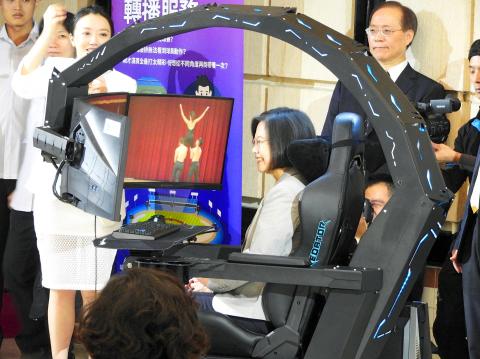Chunghwa Telecom Co (中華電信) yesterday conducted a 5G spectrum-based field trial for autonomous vehicles at a lab in New Taipei City’s Banciao District (板橋) to demonstrate vehicle-to-infrastructure technology developed by a subsidiary.
The company expects to provide more autonomous vehicle tests and trials using 5G networks at its lab in the future.
“Our aim is to help grow this 5G value chain ranging from chips and small cell stations to all kinds of applications,” Chunghwa Telecom chairman Sheih Chi-mau (謝繼茂) told reporters on the sidelines of the field trial.

Photo: Lai Hsiao-tung, Taipei Times
The company focuses on the delivery of real-time information, such as traffic data to vehicles using high-speed and low-latency 5G technology, while Kingwaytek Technology Co (勤崴), a 26 percent held subsidiary, is helping to develop autonomous driving systems, particularly for shuttle buses, Sheih said.
Kingwaytek is a supplier of high-definition (HD) electronic maps and vehicle navigation systems.
“We are developing a decisionmaking system for self-driving vehicles and a traffic prediction system, which will be combined with our HD electronic maps to complete our self-driving solution,” Kingwaytek chairman Alfred Ko (柯應鴻) said.
Kingwaytek plans to conduct a series of self-driving field trials next year in collaboration with Automotive Research and Testing Center (車輛研究測試中心) via a sandbox program in Changhua County, Ko said.
The trial, if successful, would pave the way for the company to sell its self-driving solutions overseas in the next two to three years, injecting new revenue growth momentum into the business, he said.
Southeast Asian nations would be ideal markets, as Chunghwa Telecom’s strength in the region could provide leverage, he said.
Kingwaytek operates one autonomous vehicle trial field in Changhua County and another in Taoyuan’s Hutoushan (虎頭山).
Yesterday, Chunghwa Telecom and Taiwan Mobile Co (台灣大哥大) both said separately that they have submitted their applications to bid for 5G bandwidth and are prepared to substantially invest in 5G network deployment.
Asked if Taiwan Mobile still aims to secure 100 megahertz of bandwidth at the auction, Taiwan Mobile president Jamie Lin (林之晨) said: “Only for a reasonable price.”
“Taiwan Mobile will make 5G [services] available in the second half of next year,” Lin said.
The telecom is in talks with multiple agencies about launching 5G trial fields, he said, adding that the company has one trial field in the baseball stadium in New Taipei City’s Sinjhuang District (新莊).

‘SWASTICAR’: Tesla CEO Elon Musk’s close association with Donald Trump has prompted opponents to brand him a ‘Nazi’ and resulted in a dramatic drop in sales Demonstrators descended on Tesla Inc dealerships across the US, and in Europe and Canada on Saturday to protest company chief Elon Musk, who has amassed extraordinary power as a top adviser to US President Donald Trump. Waving signs with messages such as “Musk is stealing our money” and “Reclaim our country,” the protests largely took place peacefully following fiery episodes of vandalism on Tesla vehicles, dealerships and other facilities in recent weeks that US officials have denounced as terrorism. Hundreds rallied on Saturday outside the Tesla dealership in Manhattan. Some blasted Musk, the world’s richest man, while others demanded the shuttering of his

ADVERSARIES: The new list includes 11 entities in China and one in Taiwan, which is a local branch of Chinese cloud computing firm Inspur Group The US added dozens of entities to a trade blacklist on Tuesday, the US Department of Commerce said, in part to disrupt Beijing’s artificial intelligence (AI) and advanced computing capabilities. The action affects 80 entities from countries including China, the United Arab Emirates and Iran, with the commerce department citing their “activities contrary to US national security and foreign policy.” Those added to the “entity list” are restricted from obtaining US items and technologies without government authorization. “We will not allow adversaries to exploit American technology to bolster their own militaries and threaten American lives,” US Secretary of Commerce Howard Lutnick said. The entities

Minister of Finance Chuang Tsui-yun (莊翠雲) yesterday told lawmakers that she “would not speculate,” but a “response plan” has been prepared in case Taiwan is targeted by US President Donald Trump’s reciprocal tariffs, which are to be announced on Wednesday next week. The Trump administration, including US Secretary of the Treasury Scott Bessent, has said that much of the proposed reciprocal tariffs would focus on the 15 countries that have the highest trade surpluses with the US. Bessent has referred to those countries as the “dirty 15,” but has not named them. Last year, Taiwan’s US$73.9 billion trade surplus with the US

Prices of gasoline and diesel products at domestic gas stations are to fall NT$0.2 and NT$0.1 per liter respectively this week, even though international crude oil prices rose last week, CPC Corp, Taiwan (台灣中油) and Formosa Petrochemical Corp (台塑石化) said yesterday. International crude oil prices continued rising last week, as the US Energy Information Administration reported a larger-than-expected drop in US commercial crude oil inventories, CPC said in a statement. Based on the company’s floating oil price formula, the cost of crude oil rose 2.38 percent last week from a week earlier, it said. News that US President Donald Trump plans a “secondary